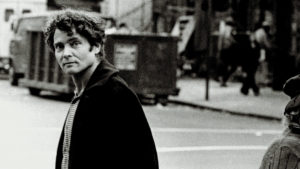The poet W.S. Merwin died last month on the Ides of March. According to the Roman calendar, the Ides fall on the 15th. When Rome dominated Western civilization, the Ides of March was believed to have been a day to settle debts. Who knows what debt Merwin owed on this celestial plane. What many of us know is what he gave.
His publishing house issued a statement saying he had died in his sleep on his 16-acre conservancy in Hawaii where he curated and nurtured a collection of rare palm trees. The headline of his obituary in The New York Times called him “The Poet of Life’s Damnable Evanescence.” Not too paltry a job title.
Merwin was a U.S. Poet Laureate, a two-time Pulitzer Prize winner for poetry and the recipient of every other high-octane prize conferred upon poets. I first found him in the text corridors of The New Yorker about 20 years ago. On a joyless, three-column page of all type, Merwin’s 10-line poem emitted a radius of soft light like a candle in a cave. It was unfastened from punctuation, economic and complex, humming with subterranean delight. As I read his poem, my head went blank, and I was liberated from all that binds me.
At The Same Time
While we talk
thousands of languages are listening
saying nothing
while we close a door
flocks of birds are flying through winters
of endless light
while we sign our names
more of us
lets go
and will never answer
I read the poem again and again and felt like an astronaut adrift in space but tethered to a mother ship that had decoded all my insides. Merwin’s poem was a treasure map, a clue, an invitation. I ripped it from the magazine, tucked it into my notebook and registered the carbonated swirling inside my chest. It was a sensation like falling in love.
And it is love, isn’t it, when we chance upon someone with whom we feel seen, recognized? Someone who opens a small, secret door into the reverent astonishments all around us? I turned toward his poems like the broad faces of sunflowers position themselves into the path of the direct light. Thousands did. Merwin was one of the most influential American poets of the last 50 years. I was one under his sway.
“We must want to listen,” Merwin once told an interviewer. In my swamp of competing and messy wants, I try to heed his words and invite enough stillness to allow the listening to flower. This is my practice. Often I fail. I have no sufficient words I can call mine to give to this man who deployed language with such luminous agility, and yet I offer him one: thanks. And I offer here his poem of the same name.
Thanks
Listen
with the night falling we are saying thank you
we are stopping on the bridges to bow from the railings
we are running out of the glass rooms
with our mouths full of food to look at the sky
and say thank you
we are standing by the water thanking it
standing by the windows looking out
in our directions
back from a series of hospitals back from a mugging
after funerals we are saying thank you
after the news of the dead
whether or not we knew them we are saying thank you
over telephones we are saying thank you
in doorways and in the backs of cars and in elevators
remembering wars and the police at the door
and the beatings on stairs we are saying thank you
in the banks we are saying thank you
in the faces of the officials and the rich
and of all who will never change
we go on saying thank you thank you
with the animals dying around us
taking our feelings we are saying thank you
with the forests falling faster than the minutes
of our lives we are saying thank you
with the words going out like cells of a brain
with the cities growing over us
we are saying thank you faster and faster
with nobody listening we are saying thank you
thank you we are saying and waving
dark though it is


